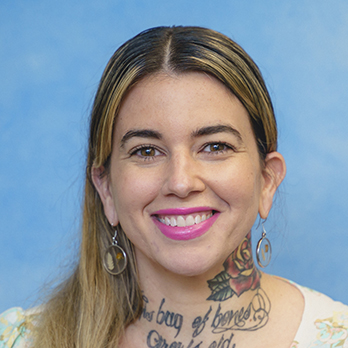Religious Diversity

What brings you meaning and purpose?
For each of us, the way in which we find meaning can look different, and it often is influenced by our unique backgrounds, cultures, and the traditions of our families and communities. It also can change as we journey through our lives. In my early 30s, for instance, I found yoga and meditation at a local studio.
Fast forward a few years, I now am a registered yoga teacher after obtaining 200 hours of training. Through this practice, I found release, grounding, and the deepening of my spiritual journey. I reconnected with myself and a higher power that I had lost for many years. I began learning to breathe (yes, you read that right.)
So often, our breaths are linked to our sympathetic nervous system when in an active state of fight or flight or during times of stress. When we learn to breathe with more intention and create longer exhales to inhales, we can activate our parasympathetic nervous system to “rest and digest” in order to instill relaxation.
Let’s take a deep breath together. Place one hand on your heart and another on your belly. Breathe in through your nose for a count of two, hold for a count of one, and exhale gently out of the mouth for a count of four. Notice how your body feels. Remember, you can return to this at any time and in any space.
Many religions are associated with specific spiritual rituals, such as yoga and meditation. However, spirituality and religion are not one and the same. Religion is a set of organized beliefs or practices and an observation of faith. While there are many different religions and sects of each, it was Mahatma Gandhi who said, “Religions are different roads converging to the same point.”
In all religions, we can find there is a similar foundation, including belief and hope, as well as community and belonging.
A brief overview of select religions:

Judaism:
- Began around 4,000 years ago.
- Belief in the Torah, laws were given to the Israelites at Sinai.
- Observance of Passover, Rosh Hashanah, Yom Kippur, Hanukkah, and Purim.
Islam:
- Islam is an Arabic word that means “surrender, submission, commitment, and peace.”
- Belief in one God, Allah, through sacred scripture, the Quran.
- Observance of Eid al-Adha and Eid al-Fitr.
Christianity:
- Split into three branches and numerous denominations.
- Belief in one God through three parts: God himself, the son Jesus Christ, and the
Holy Spirit. - The Holy Bible is Christianity’s sacred text.
- Observance of Christmas and Easter.
Buddhism:
- Siddhartha Gautama was the founder of Buddhism, but not a God.
- Belief in enlightenment through the cycle of suffering.
- Buddhism has several sacred texts, including Tipitaka.
- Observance of Vesak.
Hinduism:
- No one founder but embraces a fusion of various beliefs.
- Worship in Brahman, but also recognize many other deities.
- Primary sacred texts include The Vedas, as well as many others.
- Many observances and celebrations, including Holi and Diwali.
Taoism:
- Attributed to Lao Tzu.
- Balancing forces, Yin and Yang, with the belief that all should live in harmony with the universe.
- Tao Te Ching is a sacred text for Taoism, sometimes called Daoism.
- Taoism has many festivals that celebrate purification and peace.
Jainism:
- Path to enlightenment through non-violence.
- Has spiritual leaders and teachers, including Mahavira.
- Sacred texts include the Agamas.
Paganism:
- Can be unique and open for each individual while including nature and harmony with the Earth.
- The belief in more than one God.
- Has no sacred scripture, but rather the natural world and life experiences.
- Samhain is a holiday celebrated, as well as many others.
Source:
There are other religions, sects, and denominations throughout the world. The Wright Centers for Community �ʼһ��� and �ʼһ��� Medical Education respects all of our diverse paths and unique experiences. Take a moment to celebrate your journey.
A brief overview of select religions:
I briefly discussed spirituality at the beginning of this blog. Spirituality is an open feeling, sense, or belief in something greater than yourself. It can be anything that gives your life a higher purpose or value, including nature, community, journaling, yoga, and many other things. These practices do not have to be in a temple or building. There is simply no right or wrong way to be spiritual. Spirituality comes from deep within. For example,
Do you seek the meaning of life?
Are you in some way hungry for that everlasting solace?
Do you find peace when you pray and meditate?
Do you feel deep satisfaction when you show compassion and help others?
Do you feel a sense of security when you surrender to a higher power?
If you answered yes to any of the questions above, you are indeed spiritual.

(Questions and Image: ArtofLiving.org)
Whether you follow a specific religion, have a spiritual practice, or both or neither, it is possible to find meaning and purpose in life. The more we recognize we are not alone and share this journey with others, the more spiritual we become. Remember, we are all unique and have our own paths.
Thank you,


Allison LaRussa, B.A., CPS, RYT
Director, �ʼһ��� Humanities
The Wright Centers for Community �ʼһ��� and �ʼһ��� Medical Education
Employees share: What is your favorite spiritual or religious tradition?
“Daily meditation practices to connect my mind, body, and spirit.”
“Eid ul Fitr, and Eid ul Adha.”
“The breaking of the wafer during Christmas Eve dinner. The tradition mimics the sharing of the Eucharistic in the Roman Catholic religion and is commonly practiced by those of Polish descent.”
“N�����������ٰ���.”
“We traditionally celebrate Russian Christmas Eve in honor of my Dad, who has passed. My older siblings and my nieces and nephews make all the food.”
“Litha (Summer Solstice)”
